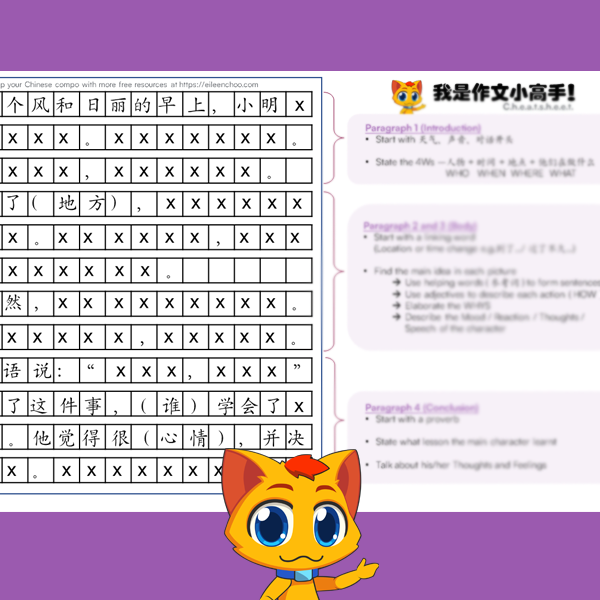
If you are looking for Chinese idioms, or cheng yu, to describe feelings in your Chinese compo, then look no further!
In this post, I’m going to share 5 easy, useful Chinese idioms that you can use in your primary school Chinese compo examinations to describe every common emotion.
Chinese idiom to describe how happy someone is
Let’s start with the Chinese idiom that we can use to describe happiness.
Instead of using the word 高兴 (gao xing) to describe a happy character in your Chinese composition, try using more interesting Chinese phrases like 手舞足蹈 (shou wu zu dao), 露出微笑(lu chu wei xiao) or 兴奋不已 (xing fen bu yi).
The first Chinese idiom 手舞足蹈 (shou wu zu dao) literally translates into hands dancing and legs dancing. Imagine a child waving his hands excitedly while jumping for joy, this image sticks better than the usual Chinese 高兴.
Beside this good phrase, we can also describe how happy someone is by describing how they look. 露出微笑 is not exactly an idiom, but it’s a simple way of describing someone’s happy smile.
If you want to take it a step further, you can use the Chinese idiom 兴奋不已 which means excitement in Chinese.
Then what are some sad phrases that you can use for composition writing? Let’s look at some Chinese idioms to describe sadness next.
Chinese phrases for sadness
Instead of describing how sad a character is by using basic Chinese words like 难过 (nan guo) in your Chinese composition, try using the Chinese chen yu 哇哇大哭 (wa wa da ku) instead.
This Chinese idiom has the same meaning as wailing in sorrow. You’ve probably learnt this a good phrase for your English composition. Unlike the previous Chinese idiom, this phrase adds sound to your compo, making it easier for your reader to imagine how sad the character is when they are crying.
Sadness forms in many forms. Let’s look at another idiom for a sad emotion like disappointment.
Chinese idioms for disappointment
A sad character doesn’t always cry. Sometimes, your character might just be disappointed by some event that happened. How can you describe such a feeling?
We can describe a sad, disappointed expression with the cheng yu 垂头丧气 (cui tou sang qi). This means that same as sighing in despair and it helps the reader imagine how disappointed your character looks.
Besides these idioms about happiness and sadness, we often see angry characters appearing in compositions too. How do we better describe their feelings?
Chinese compo phrases for angry
The worst way to describe an angry character is to make himthe character say “我很生气 I am angry.” That’s too obvious.
So what kind of angry Chinese phrases can we use for our compo?
The answer is 火冒三丈 (huo mao san zhang).
This is a Chinese idiom that is both visual and easy to write. The literal meaning of the cheng yu huo mao san zhang is “fire shot up 3 feet high”. In other words, the flames of anger are so strong that it’s about the explode. You are very angry.
Chinese compo phrases for shock
Finally, the last Chinese idiom that will be useful to know is one that describe how shock 惊讶 a character is. For this last idiom, I’ve chosen the phrase “面如土色 mian ru tu se”. This is another Chinese idiom that is both visual and easy to write.
Now that you’ve learnt some examples of popular Chinese idioms to describe feelings, be sure to use them in your Chinese compo and see what difference it makes.
If you are looking for more good Chinese phrases for compo besides idioms, check out this post.






